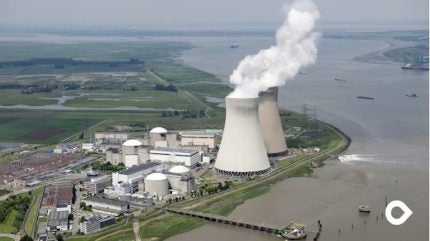
Belgium’s new coalition government, formed after months of tough negotiations, has outlined plans to continue operating two of the country’s reactors for another 10 years, beyond the 10-year extension already agreed, and construct new reactors. This effectively reverses plans to phase out nuclear power.
Belgium has seven nuclear power reactors – three at Tihange near Liege and four at Doel near Antwerp. All seven units are pressurised water reactors operated by Electrabel, part of Engie. Apart from Doel 1&2, which are 430 MWe plants, the others have a capacity of approximately 1000 MWe. Doel 3 was permanently shut down in September 2022 followed by Tihange 2 in January 2023 after 40 years of operation.
Nuclear power had long been a contentious issue in Belgium. After more than 20 years of debate, Belgium in 2020 decided to phase out nuclear power. However, in 2021, the authorities put forward two scenarios: plan A, to phase out nuclear power by 2025; and plan B to extend the life of two units for 10 years in the event of supply problems.
Plan A was initially favoured but following the conflict in Ukraine and resulting energy shortages plan B was adopted in March 2022 with a decision to extend the lives of Tihange 3 and Doel 4 until 2035. The two reactors, which have been in service since 1985, are 89.8% owned by Engie’s Electrabel and 10.2% by EDF’s subsidiary Luminus.
Federal and regional elections in 2024 saw the so-called Arizona coalition of parties begin talks on forming a coalition government. The five Arizona parties were: the right-wing N-VA, New Flemish Alliance (Nieuw-Vlaamse Alliantie); liberal MR Reformist Movement (Mouvement réformateur); centrist Les Engagés (The Committed Ones); Flemish socialist Vooruit (Onward); and CD&V Christian Democratic and Flemish (Christen-Democratisch en Vlaams).
After eight months of negotiations, a “hard deadline” was set for 31 January, by which time a deal would have to be reached or formator Bart De Wever (N-VA) would give up. The five Arizona parties then finally agreed on the key points that will set out the next government’s programme and De Wever was sworn in as prime minister.
“We are targeting a 4 GWe share of nuclear power in our electricity mix,” the agreement states. “The government is committed to ensuring the extension of existing capacity in the short term and in the longer term we are investing in building new capacity.”
Specifically, De Wever’s government wants to change the nuclear phase out law to facilitate the construction of new NPPs. It also wants to extend the life of the Doel 4 and Tihange 3 nuclear reactors by at least 10 years in addition to the existing 10-year extension decided by the previous government.
The government also wants to look into the extension of Doel 1, Doel 2 and Tihange 1 nuclear reactors. These reactors are the oldest in the country and are already in the process of being decommissioned. Doel 1 is due to be be permanently disconnected on 14 February.
In addition, the De Wever government wants to work out a concrete plan to support the construction of the first small modular reactor (SMR) in Belgium. The aim is to generate 4 GW of nuclear power, using both existing nuclear reactors and new initiatives.
According to Energy Minister Mathieu Bihet the plan is to double the existing 4 GWe of nuclear capacity. “It’s 4 gigawatts plus 4 gigawatts,” he told financial daily Tijd. He noted that building new small modular reactors (SMRs) alone could not provide sufficient capacity. “Which technology we will use, we still have to evaluate. But it is clear that it will not only be SMRs. Only small reactors will not suffice.”
The agreement was welcomed by the Belgian Nuclear Forum (BNF). “There is no time to lose on the energy issue,” it said. “We must, without further delay and as a priority, adapt or even repeal the law on the nuclear phase-out, so that there is no longer any legal obstacle to the extension of existing reactors and the construction of new nuclear reactors.”
BNF added: “It is urgent now to get to work by constituting a Task Force bringing together different actors that will allow this nuclear revival…. It is important to get to work immediately so that this relaunch of nuclear power in Belgium is done within the time and budget planned to face the shortage of electricity announced, in particular by Elia.”
With respect to the extension of existing nuclear reactors, BNF said the NPPs are necessary to ensure security of supply. “The government must therefore take the necessary measures to protect these critical infrastructures (the existing nuclear reactors), avoiding the consequences produced during the closures of Doel 3 and Tihange 2.”
With regard to the construction of new nuclear reactors, SMRs “should be considered first”. The nuclear industry in Belgium generally agrees that water-cooled (third generation) SMRs can be operational faster than lead-cooled (fourth generation) SMRs. The latter, which are more innovative, are currently being developed at the SCK CEN research centre in Belgium.”
Nuclear operator Engie strongly opposes De Wever’s plans and is concentrating on decommissioning the already shut-down nuclear plants, safely shutting down the reactors that will close in 2025 and extending Doel 4 and Tihange 3 until 2035. Keeping nuclear power plants open even longer is “unthinkable”, said Engie Belgium CEO Vincent Verbeke in January.
BNF commented saying that, if Engie maintains its stance against a further extension to the operation of the units, “the government will have to switch to an alternative plan as soon as possible with the help of the task force. This means that it will be necessary to find another interested operator(s) to continue operating the existing nuclear reactors”.
MR deputy and new Energy Minister Mathieu Bihet described the Verbeke’s comments as “unacceptable”. Engie remains “at the government’s disposal to answer questions or provide clarifications”, he said.






